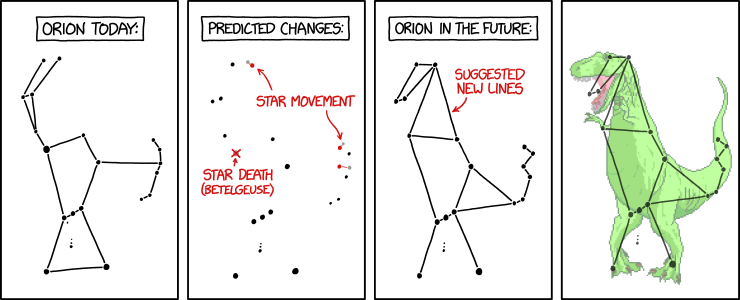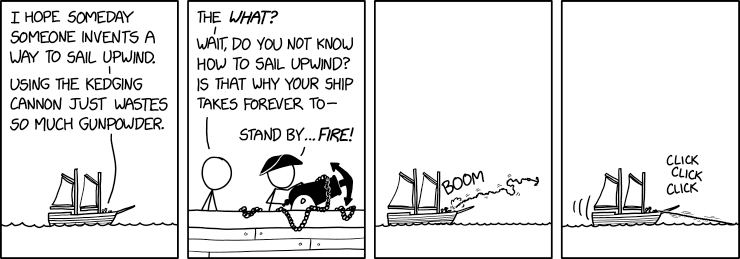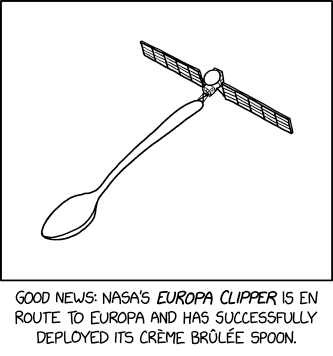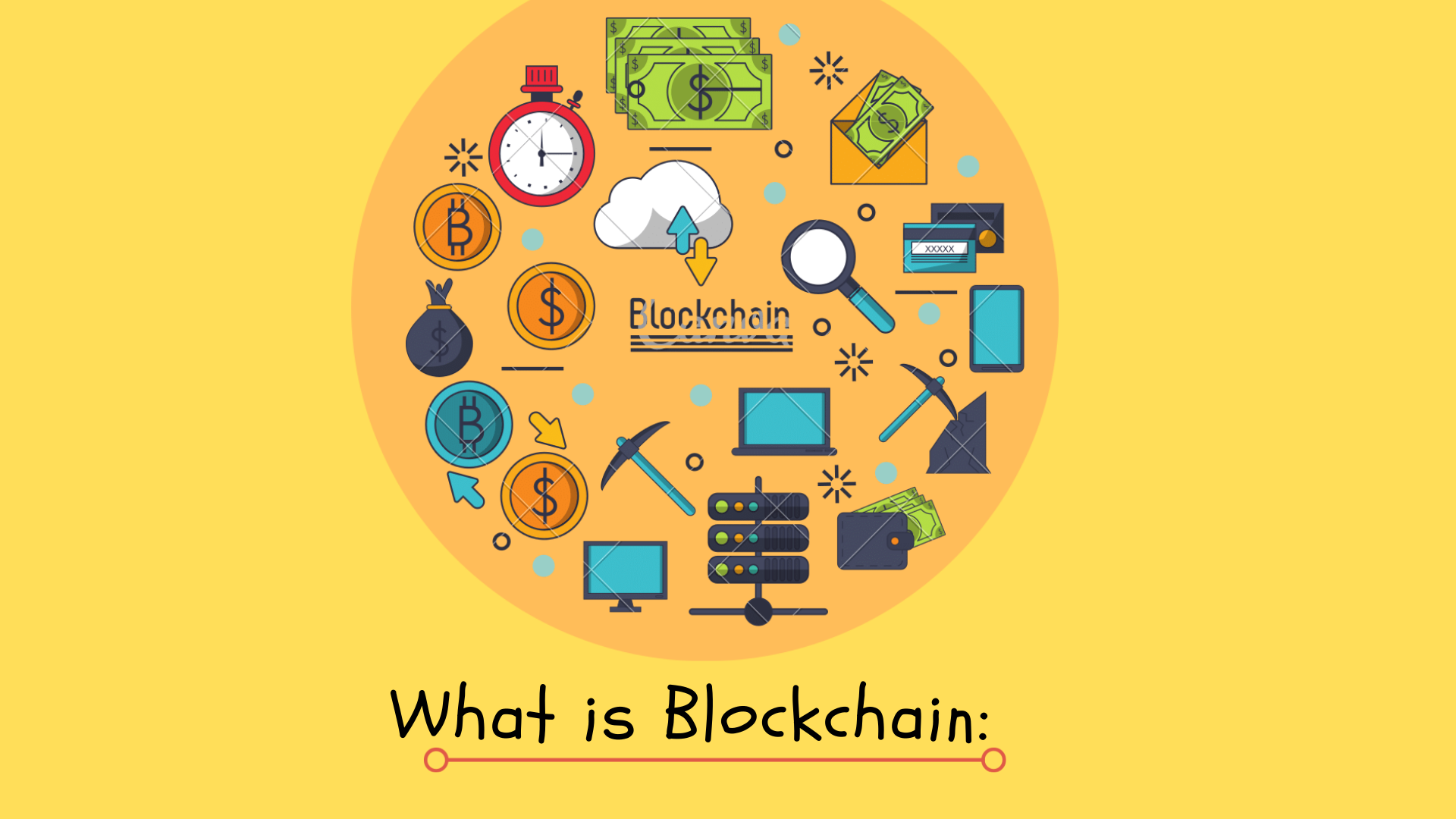********** XKCD **********
return to top
The Future of Orion
Match ID: 0 Score: 1000.00 source: xkcd.com
qualifiers: 1000.00 xkcd
Kedging Cannon
Match ID: 1 Score: 1000.00 source: xkcd.com
qualifiers: 1000.00 xkcd
Europa Clipper
Match ID: 2 Score: 1000.00 source: xkcd.com
qualifiers: 1000.00 xkcd
Arizona Chess
Match ID: 3 Score: 1000.00 source: xkcd.com
qualifiers: 1000.00 xkcd
Filter efficiency 99.593 (4 matches/984 results)
********** UNIVERSITY **********
return to top
NASA’s Brad Doorn Brings Farm Belt Wisdom to Space-Age Agriculture
Wed, 20 Nov 2024 17:30:45 +0000
From his South Dakota roots to leading NASA’s agricultural program, Brad Doorn’s mission has remained the same: help farmers feed the world.
Match ID: 0 Score: 40.00 source: science.nasa.gov age: 0 days
qualifiers: 30.00 tuition, 10.00 school
NASA Engineer Carries Indigenous Roots into New Aviation Era
Tue, 19 Nov 2024 13:10:13 +0000
Growing up outside of Philadelphia, Abigail Reigner spent most of her childhood miles away from where her family called home, and where there was little trace of her Native American tribe and culture. Belonging to the Comanche Nation that resides in Lawton, Oklahoma, Reigner’s parents made every effort to keep her connected to her Indigenous […]
Match ID: 1 Score: 10.00 source: www.nasa.gov age: 2 days
qualifiers: 10.00 school
From Campus to the Courts, the “Palestine Exception” Rules University Crackdowns
Mon, 18 Nov 2024 19:04:56 +0000
The fights over Gaza protests are playing out online, in campus quads, internal disciplinary proceedings, and in the courts.
The post From Campus to the Courts, the “Palestine Exception” Rules University Crackdowns appeared first on The Intercept.
Science editor Ian Sample joins host Madeleine Finlay to discuss some of the most intriguing science stories of the week. From a study finding that fat cells ‘remembering’ past obesity drives yo-yo dieting, to concerning developments in the bird flu virus, and research pinpointing which parts of the UK are best at spotting fake accents
Clips: RTE, BBC, Global News
Can you spot a fake accent? Take part in a new study from Cambridge University
Continue reading...The double Olympic triathlon champion Alistair Brownlee has announced his retirement. The 36-year-old Briton became the first triathlete to successfully defend his Olympic title when he retained the title in Rio de Janeiro in 2016, four years after triumphing on home soil at London in 2012.
“It’s time to close this chapter … This marks my transition from professional triathlon, a moment approached with both dread and excitement in equal measure,” Brownlee, whose first significant title came in winning the 2006 Junior European Duathlon, wrote on social media.
Continue reading...‘Stoney’ has been worn by everyone from Drake to Keir Starmer, but its position as label of choice on the terraces gets the highest attention score. We talk to its chair and former owner
In a quiet corner of Stone Island’s flagship London store in Soho, the brand’s Italian chair, Carlo Rivetti, is talking about darts. “You see these big fat guys,” says Rivetti, who is sporting whiskers that make him look more like a trawlerman than a fashion magnate. “Pom … pom … pom,” he adds, imitating the noise a dart makes when it hits the board.
Darts is possibly the one British subculture that Rivetti’s brand hasn’t touched: football casuals, rappers, politicians, musicians and athletes have all reached for “Stoney” as it is known in the UK, as a sign of masculine cool. Darts might just be the final frontier.
Continue reading...The fate of the new “click-to-cancel” rule will show whether some Republicans are serious about cracking down on anti-competitive practices.
The post The Looming GOP Battle Over Whether You Have to Go to Hell and Back to Cancel Amazon Prime appeared first on The Intercept.
I get Kennedy’s appeal, but Trump will undo the protections with the most direct, proven impact on our health.
The post RFK Jr. Talks About Public Health, but He’s Joining an Administration That’ll Make Us Sicker Than Ever appeared first on The Intercept.
Three recipes that get their sweetness more from fruit than added sugar: a flaky-crusted apple pie, a buttery bourbon apple slab tart, and a date and pecan pie
During the holidays, Thanksgiving included, many people crave familiar flavours, not cutting-edge cuisine. The recipes that follow do have a twist – they get most of their sweetness from fruit – but this apparent novelty is arguably rooted in tradition. The idea of looking beyond cane sugar, honey and maple syrup to sweeten desserts may sound newfangled, but, as Michael Pollan explained in his 2002 book The Botany of Desire, fruit is what often satisfied the sweet tooth before the broad accessibility of purer sugars. In addition to fruits in fresh, dried and pureed forms, the pastries below are suffused with unexpected sweetness from miso paste, bourbon, pecans, and spices.
You can also view these recipes and many more in the new Feast app, which has a cups calculator for US users
Continue reading...Trump’s nominee for defense secretary under scrutiny after report alleges he sexually assaulted a woman in California seven years ago
According to the report, the woman, identified as Jane Doe, “stated she observed Pete Hegseth acting inappropriately” with women at the conference, adding that he told her she was a “nice guy”.
The report stated:
“Hegseth would rub the women on their legs and Jane Doe thought that his actions were inappropriate. Jane Doe had texted [redacted] that Hegseth was giving off a ‘creeper’ vibe. The women thought Hegseth was ‘dreamy’ and wanted pictures with Hegseth. Jane Doe stated she had also taken a picture with Hegseth, earlier in the day …”
“Jane Doe stated she remembered walking out of the bar and assumed Hegseth followed her because she argued with Hegseth near the pool. The argument was about Hegseth’s actions with the women at the conference. Jane Doe remembered Hegseth tell her that he was a nice guy.
Jane Doe stated the next memory she had was when she was in an unknown room. Jane Doe did not know where she was and how she got to the room. Hegseth was in the room with her. Jane Doe remembered having her phone and Hegseth inquired to whom Jane Doe was texting. Hegseth took her phone from her hands. Jane Doe stated she got up and tried to leave the room, but Hegseth blocked the door with his body. Jane Doe remembered saying ‘no’ a lot. Jane Doe stated she did not remember much else.”
The Senate has rejected Bernie Sanders’ effort to block arms sales to Israel which the Vermont senator introduced out of concerns over the mass killings of Palestinians by Israeli forces in Gaza.
Joe Biden is set to sign the Congenital Heart Futures Reauthorization Act today which will reauthorize the national research, surveillance and awareness program on heart disease.
Trump is likely to choose Johns Hopkins surgeon Martin Makary – who raised concerns about various public health issues including opposing vaccine mandates – as head of the Food and Drug Administration.
Continue reading...Steve Reed says he may not agree on inheritance tax changes but government will listen to rural Britain
The UK environment secretary has promised to reform the food system to ensure farmers are paid fairly for the food they produce, after many filled the streets of Westminster to campaign against inheritance tax changes.
Speaking at the Country Land and Business Association (CLA) conference, Steve Reed said: “I heard the anguish of the countryside on the streets of London earlier this week. We may not agree over the inheritance tax changes, but this government is determined to listen to rural Britain and end its long decline.”
Continue reading...(Bella Union)
The singer-songwriter sticks to apocalyptic first principles on his sixth album, couching contemporary chaos in soaring ballads and discofied yacht rock
Nine years after his breakthrough album I Love You, Honeybear turned Josh Tillman from a minor indie singer-songwriter (and the former drummer of Fleet Foxes) into a critical cause célèbre, most people with any interest know broadly what to expect from a new release under the Father John Misty name. There will be blackly comic depictions of existential angst and apocalyptic dread. Songs that suggest life in the 21st century is basically unbearable and that the world is irredeemably screwed will vie with fourth wall-breaking moments where Tillman confesses his own complicity in screwing up the world. There will be barbed drawings of human relations, bleakly funny ruminations on ageing, self-lacerating reflections on his own music and career, stuff about Los Angeles, Tillman’s adopted home town, and, frequently, a lurid microcosm of all that’s wrong with the world.
Suffice to say that Mahashmashana ticks all those boxes. Indeed, it ticks quite a lot of them over the course of the opening title track, which sets a melody that evokes FJM’s most enduring musical touchstone, early 70s Elton John, to an arrangement that recalls the overripe Phil Spector production of George Harrison’s All Things Must Pass. It takes its name from a Sanskrit world meaning “great cremation ground” and alternates between describing “the next universal dawn” breaking over a silent world, and a troubled relationship between a man whose body is metaphorically compared to a chain of southern Californian gourmet food markets and a woman whose soul is a “fallen star”. Modern-day life is “a scheme to enrich assholes”, Tillman avers, before poking his head through the fourth wall and taunting himself for his pomposity: “Such revelations,” he sings, with a parenthetical roll of the eyes, “which only singers can describe.”
Continue reading...Israeli attacks have destroyed huge areas of land used for crops, with 90% of cattle killed, analysis shows
More than 90% of cattle have died and about 70% of land for crops in Gaza has been destroyed or damaged since the beginning of the war in the territory, an analysis of satellite imagery by the UN has found.
More than half of sheep and goat herds have been wiped out, while more than three-quarters of the territory’s famous orchards have been destroyed or damaged, the survey in September found.
Continue reading...There are some conversational subjects that are guaranteed to get listeners yawning. And I’ve tried them all …
There are three things I find fascinating about myself that I can’t tell anyone about without boring them to death: music, food and dreams. Someone in an audience the other day asked me what music I liked, what moved me. Don’t get me wrong: I was flattered to be asked. It’s just that there’s no way of answering the question without losing the interest of the audience, including the nice chap who asked the question in the first place.
What kinds of music do I listen to? Lots of different things. What moves me? Well, lots of stuff but, now you mention it, there was this old song by a Yugoslav pop singer, which I heard sung by a Croatian tenor at a recital in Split last summer, and I just started sobbing, I couldn’t help myself … And then I look up and see the worst sight in the world – people stifling yawns. Quite right, too, because it’s so boring listening to people bang on about what music they like.
Continue reading...Wars have spread and intensified, with far-reaching impacts on global economic growth and food security, according to latest Conflict Intensity Index
The proportion of the world engulfed by conflict has grown 65% – equivalent to nearly double the size of India – over the past three years, according to a new report.
Ukraine, Myanmar, the Middle East and a “conflict corridor” around Africa’s Sahel region have seen wars and unrest spread and intensify since 2021, according to the latest Conflict Intensity Index (CII), published by risk analysts Verisk Maplecroft.
Continue reading...Sanders’s resolutions to block arms sales to Israel gained momentum, but ran headlong into White House opposition.
The post Bernie Sanders Lost Vote to Block Arms for Israel, Says U.S. Is “Funding the Starvation of Children in Gaza” appeared first on The Intercept.
Nine health care workers at UCSF report censorship or punishment for speaking out about human rights for Palestinians — or simply wearing a pin.
The post San Francisco’s Biggest Hospital System: Don’t Talk About Palestine appeared first on The Intercept.
Police say 350-400 people have stayed in Stilfontein mine to avoid arrest after minister vowed to ‘smoke them out’
South African authorities are assessing whether it is safe to rescue potentially thousands of illegal miners who may be trapped underground, after police stopped food, water and medicine being delivered to them about two weeks ago to try to force the miners to the surface.
A police spokesperson, Athlenda Mathe, insisted to reporters on Tuesday that the miners were not trapped in the abandoned goldmine in Stilfontein, a town about 100 miles south-west of Johannesburg, but rather staying underground to avoid being arrested.
Continue reading...From timeless kitchenware to trending ingredients, here’s the Observer Food’s Monthly’s pick of presents to bring good cheer
We’ve assembled some of the most delightful and desirable culinary-adjacent items you might wish to give, or receive, this season.
Kitchen utensils that are as aesthetically pleasing as they are useful, quirky homewares and jars of things we love to eat – our list runs the gamut from “essential” to “truly essential”.
Continue reading...In the face of a second Trump term, the left must cultivate a politics of everyday life that goes beyond voting, says columnist Natasha Lennard.
The post Radical Action Under Trump appeared first on The Intercept.
I get Kennedy’s appeal, but Trump will undo the protections with the most direct, proven impact on our health.
The post RFK Jr. Talks About Public Health, but He’s Joining an Administration That’ll Make Us Sicker Than Ever appeared first on The Intercept.
A weekly email from Yotam Ottolenghi, Meera Sodha, Felicity Cloake and Rachel Roddy, featuring the latest recipes and seasonal eating ideas
Each week we’ll send you an exclusive newsletter from our star food writers. We’ll also send you the latest recipes from Yotam Ottolenghi, Nigel Slater, Meera Sodha and all our star cooks, stand-out food features and seasonal eating inspiration, plus restaurant reviews from Grace Dent and Jay Rayner.
Sign up below to start receiving the best of our culinary journalism in one mouth-watering weekly email.
Continue reading...Style, with substance: what’s really trending this week, a roundup of the best fashion journalism and your wardrobe dilemmas solved, direct to your inbox every Thursday
Style, with substance: what’s really trending this week, a roundup of the best fashion journalism and your wardrobe dilemmas solved, delivered straight to your inbox every Thursday
Explore all our newsletters: whether you love film, football, fashion or food, we’ve got something for you
Continue reading... |
Imagine a world in which you can do transactions and many other things without having to give your personal information. A world in which you don’t need to rely on banks or governments anymore. Sounds amazing, right? That’s exactly what blockchain technology allows us to do.
It’s like your computer’s hard drive. blockchain is a technology that lets you store data in digital blocks, which are connected together like links in a chain.
Blockchain technology was originally invented in 1991 by two mathematicians, Stuart Haber and W. Scot Stornetta. They first proposed the system to ensure that timestamps could not be tampered with.
A few years later, in 1998, software developer Nick Szabo proposed using a similar kind of technology to secure a digital payments system he called “Bit Gold.” However, this innovation was not adopted until Satoshi Nakamoto claimed to have invented the first Blockchain and Bitcoin.
A blockchain is a distributed database shared between the nodes of a computer network. It saves information in digital format. Many people first heard of blockchain technology when they started to look up information about bitcoin.
Blockchain is used in cryptocurrency systems to ensure secure, decentralized records of transactions.
Blockchain allowed people to guarantee the fidelity and security of a record of data without the need for a third party to ensure accuracy.
To understand how a blockchain works, Consider these basic steps:
Let’s get to know more about the blockchain.
Blockchain records digital information and distributes it across the network without changing it. The information is distributed among many users and stored in an immutable, permanent ledger that can't be changed or destroyed. That's why blockchain is also called "Distributed Ledger Technology" or DLT.
Here’s how it works:
And that’s the beauty of it! The process may seem complicated, but it’s done in minutes with modern technology. And because technology is advancing rapidly, I expect things to move even more quickly than ever.
Even though blockchain is integral to cryptocurrency, it has other applications. For example, blockchain can be used for storing reliable data about transactions. Many people confuse blockchain with cryptocurrencies like bitcoin and ethereum.
Blockchain already being adopted by some big-name companies, such as Walmart, AIG, Siemens, Pfizer, and Unilever. For example, IBM's Food Trust uses blockchain to track food's journey before reaching its final destination.
Although some of you may consider this practice excessive, food suppliers and manufacturers adhere to the policy of tracing their products because bacteria such as E. coli and Salmonella have been found in packaged foods. In addition, there have been isolated cases where dangerous allergens such as peanuts have accidentally been introduced into certain products.
Tracing and identifying the sources of an outbreak is a challenging task that can take months or years. Thanks to the Blockchain, however, companies now know exactly where their food has been—so they can trace its location and prevent future outbreaks.
Blockchain technology allows systems to react much faster in the event of a hazard. It also has many other uses in the modern world.
Blockchain technology is safe, even if it’s public. People can access the technology using an internet connection.
Have you ever been in a situation where you had all your data stored at one place and that one secure place got compromised? Wouldn't it be great if there was a way to prevent your data from leaking out even when the security of your storage systems is compromised?
Blockchain technology provides a way of avoiding this situation by using multiple computers at different locations to store information about transactions. If one computer experiences problems with a transaction, it will not affect the other nodes.
Instead, other nodes will use the correct information to cross-reference your incorrect node. This is called “Decentralization,” meaning all the information is stored in multiple places.
Blockchain guarantees your data's authenticity—not just its accuracy, but also its irreversibility. It can also be used to store data that are difficult to register, like legal contracts, state identifications, or a company's product inventory.
Blockchain has many advantages and disadvantages.
I’ll answer the most frequently asked questions about blockchain in this section.
Blockchain is not a cryptocurrency but a technology that makes cryptocurrencies possible. It's a digital ledger that records every transaction seamlessly.
Yes, blockchain can be theoretically hacked, but it is a complicated task to be achieved. A network of users constantly reviews it, which makes hacking the blockchain difficult.
Coinbase Global is currently the biggest blockchain company in the world. The company runs a commendable infrastructure, services, and technology for the digital currency economy.
Blockchain is a decentralized technology. It’s a chain of distributed ledgers connected with nodes. Each node can be any electronic device. Thus, one owns blockhain.
Bitcoin is a cryptocurrency, which is powered by Blockchain technology while Blockchain is a distributed ledger of cryptocurrency
Generally a database is a collection of data which can be stored and organized using a database management system. The people who have access to the database can view or edit the information stored there. The client-server network architecture is used to implement databases. whereas a blockchain is a growing list of records, called blocks, stored in a distributed system. Each block contains a cryptographic hash of the previous block, timestamp and transaction information. Modification of data is not allowed due to the design of the blockchain. The technology allows decentralized control and eliminates risks of data modification by other parties.
Blockchain has a wide spectrum of applications and, over the next 5-10 years, we will likely see it being integrated into all sorts of industries. From finance to healthcare, blockchain could revolutionize the way we store and share data. Although there is some hesitation to adopt blockchain systems right now, that won't be the case in 2022-2023 (and even less so in 2026). Once people become more comfortable with the technology and understand how it can work for them, owners, CEOs and entrepreneurs alike will be quick to leverage blockchain technology for their own gain. Hope you like this article if you have any question let me know in the comments section
FOLLOW US ON TWITTER
RSS Rabbit links users to publicly available RSS entries.
Vet every link before clicking! The creators accept no responsibility for the contents of these entries.
Relevant
Fresh
Convenient
Agile
We're not prepared to take user feedback yet. Check back soon!